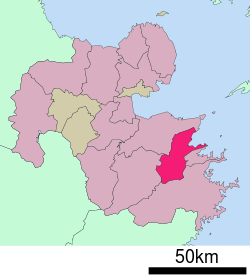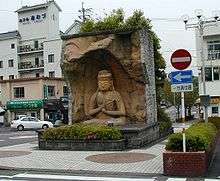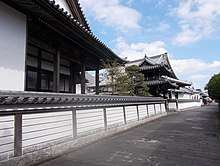Usuki, Ōita
Usuki (臼杵市, Usuki-shi) is a city located on the east coast of Ōita Prefecture, Japan. It is famous for its Usuki Stone Buddhas, a national treasure, and its soy sauce production. Recently it has become known for having the look and feel of a Japanese castle town. It is part of Ōita City's metropolitan area through economics and thus has strong ties to Ōita City.
Usuki 臼杵市 | |
|---|---|
Usuki City Hall | |
Flag  Emblem | |
 Location of Usuki in Ōita Prefecture | |
 Usuki Location in Japan | |
| Coordinates: 33°8′N 131°48′E | |
| Country | Japan |
| Region | Kyushu |
| Prefecture | Ōita Prefecture |
| Government | |
| • Mayor | Goro Nakano (since January 2009) |
| Area | |
| • Total | 291.08 km2 (112.39 sq mi) |
| Population (January 1, 2012) | |
| • Total | 41,006 |
| • Density | 140/km2 (360/sq mi) |
| Symbols | |
| • Tree | Kabosu |
| • Flower | Salvia splendens |
| Time zone | UTC+9 (JST) |
| City hall address | 875-8501 |
| Website | www |


Demographics and geography
As of March 1, 2017, the city has an estimated population of 38,090 and a population density of 140 persons per km². The total area is 291.08 km².
The city is bordered by Ōita City, Saiki, Tsukumi, and Bungo-ōno. The city looks upon the Bungo Channel in the east. The city surrounds the Bay of Usuki with the Saganoseki Peninsula in the north and the Nagame Peninsula in the south. Within the bay are Kuroshima Island and Tsukumi Island. Water from the bay flows into Usuki River, around whose flat lands town areas have been built. The northern part of the city has gently-sloping hills while the southern part has mountain ranges that are 500m to 600m above sea level.
History
The city was founded on April 1, 1950. On March 31, 1954, multiple towns were merged into Usuki.
On January 1, 2005, the town of Notsu (from Ōno District) was merged into Usuki.
William Adams reached Bungo, now Usuki City, in April 1600.
Economy
Agriculture and fishing are the primary industries, however the production of soy sauce and miso paste are also popular. Many people come from abroad to work at Usuki shipyards. The city is well known for its kabosu fruits.
Historical and Sightseeing Sites
- Usuki Stone Buddhas, a national treasure and special historical landmark
- Usuki Castle
- Nioza Historical Road
- Inaba-Family Villa, a former samurai residence
- Hakubakei
- Furen Limestone Caves, a national monument
- Meiji Era Bridge
- Nogami Yaeko Memorial Museum
- Fugen Temple, burial site of Kicchomu
- Usuki City Historical Museum, open on April 26, 2014
- Naora Nobuo Memorial Museum
Festivals
Major festivals in Usuki include the Gion Festival (mid July), Stone Buddhas Fire Festival (late August), and Bamboo Lantern Festival (early November). There are also festivities and celebrations during the cherry blossom blooming period in April, for example at Usuki Castle.
Transportation
The city is on the Nippō Main Railway Line and it can be reached by local and limited express trains.
The city is accessible by car from the Higashi Kyushu Expressway with an exit at Usuki Interchange. The national highways number 10, 217, and 502 and the Oita Prefecture roads number 21, 25, 33, and 53 also run through the city.
The Ōita Bus Company offers inter-city buses to Usuki as well as buses within the city.
Ferries travel between Usuki and Yawatahama City in Ehime Prefecture, Shikoku through the two ferry companies Kyūshi Orange Ferry and Uwajima Unyu Ferry.
Education
Excluding closed schools, Usuki City has 15 elementary schools and 6 junior high schools, all of which are city-run. There is also a prefectural school specifically for handicapped children.
- Prefectural High Schools
- Usuki High School
- Usuki Shougyou High School (for Commerce) (closed down)
- Usuki Kaiyou Kagaku High School (for Marine Science)
- Notsu High School (closed down)
Famous People from Usuki
- Tatsuo Yamamoto, politician
- Tadatomo Yoshida, politician
- Yaeko Nogami, novelist
- Jun Hirose, baseball player
- Hiromi Wada, baseball player and commentator
- Masako Miura, voice actress
- Maiko Itai, model and Miss Universe 2010
- Keiko Komuro, singer
Movies set in Usuki
- なごり雪 (The Last Snow) (2002)
- 22才の別れ Lycoris 葉見ず花見ず物語 (Exchange Students - Goodbye to You) (2007)
Sister Cities


References
Sources
This article incorporates information translated from the article 臼杵市 (Usuki-shi) in the Japanese Wikipedia, retrieved before September 28, 2011.
External links

- Usuki City official website (in Japanese)
- Usuki City Tourism Promotion Film 2014